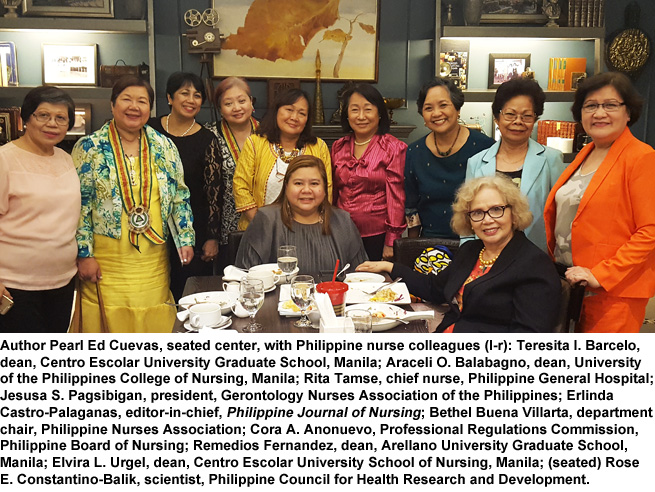How do you address nurse leaders in YOUR country?
 There are many things they did not teach me as I was earning my PhD. But I did learn to value the wisdom of those leaders who have gone before me.
There are many things they did not teach me as I was earning my PhD. But I did learn to value the wisdom of those leaders who have gone before me.
Since graduating with a PhD in nursing, I have been in contact with several nursing leaders in my country—the Philippines—some for professional collaboration and networking, others on a more social basis. I am still in awe. I look up to nursing luminaries such as members of the Philippine Board of Nursing, presidents of nursing associations, chief nurses of large hospitals, and deans of well-known colleges of nursing. They drive the nursing profession in our country, and I want to be like them someday.
 After my initial euphoria of meeting them—like a fan meeting a superstar—the researcher in me prevailed, giving me the boldness to ask a personal question: “How did you become who you are?” (You see, I’m curious; I wanted to know!) But in the Philippines, that’s not how we pose that question. We ask, “How to be you po?”
After my initial euphoria of meeting them—like a fan meeting a superstar—the researcher in me prevailed, giving me the boldness to ask a personal question: “How did you become who you are?” (You see, I’m curious; I wanted to know!) But in the Philippines, that’s not how we pose that question. We ask, “How to be you po?”
The word “po” is a Filipino term that shows respect and courtesy to a person of authority. In our culture, we normally don’t ask direct questions of a person with higher social or professional status without including “po.” So I asked. Well, I asked some of them. In some cases, I asked directly. In others, the question was in my mind as I listened to their stories, and I got enough information to compile the following tips that I think will help future nurse leaders like me.
Be persistent. If you want to be somebody someday, you need to work for it. Study and learn about what you want to do. Apply for the position you want. Even if challenges come your way, do not be frustrated. Be persistent. Keep improving your craft. When you achieve the position you’ve aimed for, don’t stop there. Keep learning. Attend seminars and conferences; they will help you gain confidence to share what you have learned.
Know your role. We all have roles to play in our institutions, organizations, and professions—in life—and we need to know which role we are performing at a particular time. Sometimes we wear the hat of a CEO, other times that of a nurse, and on other occasions, the hat of a mother or wife. All are important. Therefore, we need to know when to show sides of ourselves that enrich our lives. Create balance in your roles so every aspect of your life gets a piece of you.
Be available and volunteer. When people know you and the quality work you do, they will seek you out. It may be a request to speak, be a member of a committee or its head, or serve as a representative, to name a few. When opportunities come, be available if possible. Better yet, volunteer! Everything is a learning experience, and making yourself available demonstrates you are a leader who is willing to share. Volunteering shows you are committed to doing something important to you or to the profession, and you are willing to give your time without remuneration.
Know when to say no. A time will come when you feel overwhelmed with so many things to do—committee memberships, consultations, meetings, and other responsibilities—that you need to make choices. Choose what is most important to you, and say no to the others. At this stage, you cannot accommodate every activity offered to you. Choose based on urgency, importance, or priority of advocacy. Make sure that whatever you can accommodate is worthy of your time. Give your best effort to whatever you do accept. It is not fair to the requester and those you serve to do so halfheartedly or haphazardly. It’s wise to say no to things you cannot properly accomplish so you can give ample time to whatever is left on your table.
Do not idolize. We all have role models, people we look up to and believe in. Sometimes we look up to people so much that we idolize them and, in the process, forget who we are. Leaders are human, too, and make mistakes. When they do, our self-perceptions can be shattered if our identities are too deeply rooted in our role models. Know who you are, and be who you are. Admire leaders, yes, but also be the kind of leader worthy of admiration.
Leave a legacy. We all work for something. But when we have the money we need and are content economically, we continue working for intangible things. We work for the love of our profession, to seek better work conditions for nurses, to advocate for the welfare of nurses, and a host of other altruistic goals. Once you find what you are passionate about in nursing, leave a legacy—one that people will remember for years to come.
Laugh. When things don’t go as planned, and conflicts arise because of so many bright ideas offered in a meeting, remember that humor can help resolve conflict. It helps remind you that, “Hey, at the end of the day, we are still friends!” We are all doing this for one great cause, so why not laugh at our individual differences and settle the conflict in a lighthearted manner?
There are many things they did not teach me as I was earning my PhD. But I did learn to value the wisdom of those leaders who have gone before me. Knowing about the personal experiences of nursing leaders who have been the voices of nurses in our country is such a humbling experience. I am so excited, and I look forward to the time when I write about what I have learned from our international nursing leaders. RNL
Pearl Ed G. Cuevas, PhD, MAN, RN, FGNLA, is associate professor III, Centro Escolar University School of Nursing and Graduate School, Manila, Philippines.
Editor’s note:
Pearl Ed Cuevas will present “The Lived Experience of LGBT Older Persons in a Geriatric Home Facility” on Saturday, 21 July 2018, at Sigma’s 29th International Nursing Research Congress in Melbourne, Australia. Register here for congress.
Check out these additional articles by presenters at the 29th International Nursing Research Congress.